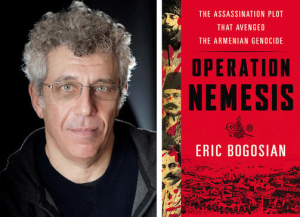Bogosian Spotlights the Extraordinary Men of Operation Nemesis
September 25, 2015Author and actor Eric Bogosian enjoyed a warm Watertown homecoming on Mon., Sept. 14, discussing his acclaimed book Operation Nemesis: The Assassination Plot That Avenged the Armenian Genocide before a capacity crowd at the St. James Armenian Church Men’s Club. Bogosian, who was raised in Watertown and Woburn, Mass., attending St. James as a boy, said how meaningful it was for him to speak to such a crowd at a church where he served as an altar boy and of which his grandfather was a founder decades ago.

Author and actor Eric Bogosian enjoyed a warm Watertown homecoming on Mon., Sept. 14, discussing his acclaimed book Operation Nemesis
Realizing that he is at a place in his career where his success has afforded him a high level of visibility, Bogosian explained that he sees the book as a kind of “Trojan horse” that will get knowledge of the Armenian Genocide to a non-Armenian readership that might otherwise never learn about it. Observing that even within the Armenian community the level of historical knowledge is not necessarily that high, he noted that among many well-educated Americans it is simply non-existent, and that he has gotten many comments from friends who read his book and learned about the Armenian Genocide for the first time.
Bogosian, whose grandfather Megerditch and great-grandmother narrowly escaped the genocide, read a portion of the book’s opening chapter in which he recalled hearing his grandfather’s stories and his own sense of disconnect, as a thoroughly Americanized youth, from the intensity of his grandfather’s experiences in a seemingly far-off place and time.
It was only much later, Bogosian explained, after he was an established actor (albeit one who refused to change his name and appearance to become less “ethnic”), that he began to seriously investigate the history of the Armenian Genocide. Prompted in part by his role in Atom Egoyan’s Ararat and by reading Peter Balakian’s memoir of his developing Armenian-American consciousness, Black Dog of Fate, and spurred by the attention paid to the Armenian Genocide and Soghomon Tehlirian in Samantha Power’s A Problem from Hell, Bogosian developed an interest in the dramatic story of Tehlirian’s assassination of Talaat Pasha in Berlin in 1921.
Bogosian explained how he read these accounts and the trial transcript and began to conceive of a screenplay. However, then he read Jacques Derogy’s study Resistance and Revenge: The Armenian Assassination of the Turkish Leaders Responsible for the 1915 Massacres and Deportations (first published in French in 1986 and translated into English in 1990). Derogy, who as Bogosian explained, had access to material in the archives of the Armenian Revolutionary Federation, gave an account that differed from and greatly expanded on that of, for example, Power.
Bogosian then undertook several years’ worth of intensive reading on Armenian and Ottoman history and related topics. Since he does not know Armenian, he worked with scholar Aram Arkun who translated for him important works such as Tehlirian’s autobiography. He came to the conclusion that the story of Nemesis needed to be told in a factual way that would reach as wide a readership as possible. He writes that “Tehlirian and his cohorts were not simply avengers,” and that “through their actions [they] tried to offset in some way the anonymous deaths of hundreds of thousands of innocent civilians who died in the deserts and in their homes and in mountain wastelands.” He declares that “to the million and a half Armenians who perished at the hands of Ottoman Turks during the First World War, and to their countless descendants, the actions of Operation Nemesis shouted, ‘You existed. You are memorable. We remember you.’”
Bogosian pointed out in his talk at St. James, as he does in the book, that although the actions taken by Operation Nemesis were entirely illegal, and that the rule of law is important and should be respected, “the men and women of Operation Nemesis did what governments could not. They were appealing to a higher, final justice.”
It is noteworthy that Bogosian gave a talk that hailed the heroism and ingenuity of the “ordinary men” who planned and carried out Operation Nemesis, all of whom were, of course, members of the ARF, in the hall of a Diocesan church. Bogosian’s work and its reception goes a long way towards breaking down the barriers in the Armenian community by emphasizing that the importance of Tehlirian and the rest of the masterminds of Nemesis should be appreciated by all Armenians of any political stripe, even while recognizing that they were products of the specific political ideology of the ARF. More, even, than being of interest only to Armenians, these men changed world history, Bogosian stated.
Bogosian seems to be on a mission to inform everyone he can reach that the unpunished crime of the Armenian Genocide forced ordinary men to become extraordinary ones and to pursue the justice that the Armenian people were denied. Armenian celebrities who seldom, if ever, get involved in the community or get their hands dirty working on causes we hold dear are generally criticized or viewed with scorn. It might have taken him a while, but Eric Bogosian has performed a valuable service by bringing attention to these ordinary men and their extraordinary deeds.
Source: Armenian Weekly
Link: Bogosian Spotlights the Extraordinary Men of Operation Nemesis